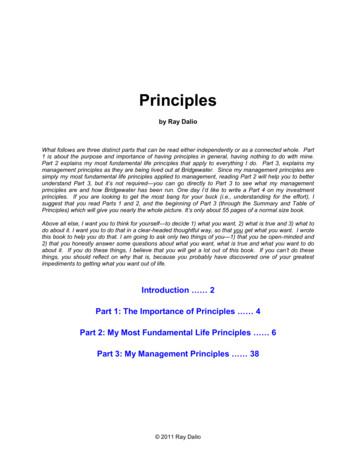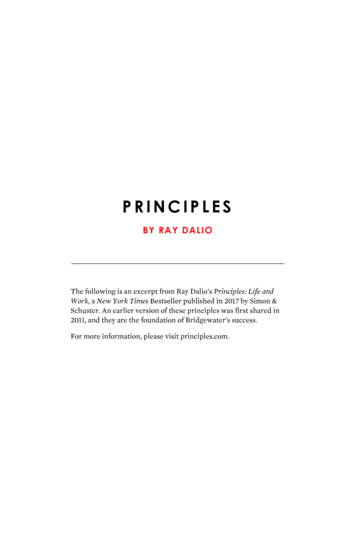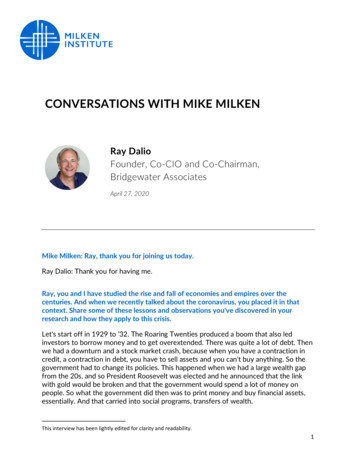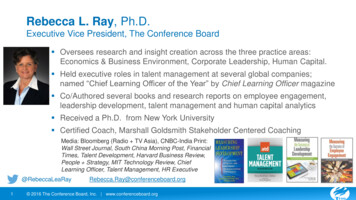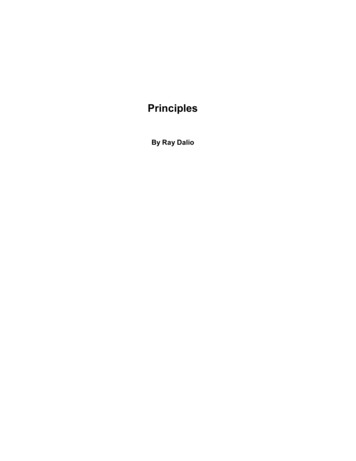
Transcription
PrinciplesBy Ray Dalio
PrinciplesBy Ray DalioPrinciplesWhy I Wrote ThisPart 1 – My Most Fundamental PrinciplesWhere I’m Coming FromMy Most Fundamental PrinciplesThe Personal Evolution ProcessYour Most Important ChoicesThe 5 Steps to Personal EvolutionThe 5 Steps Close-UpAppendix: 10 Steps to Personal Decision-MakingPart 2 – My Management Principles157916212329324650Get the People and the Culture Right50Getting Specific54A) To Get the Culture Right 575759 Truth is Essential Recognize That Mistakes are Good if They Result inLearning Constantly Get in SynchB) To Get the People Right The Most Important Decision You Make is Choosing theResponsible Party Recognize That People are Built Very Differently Hire Right, Because the Penalties of Hiring Wrong areHuge Understand the Differences Between Managing,Micromanaging and Not Managing Probe Deep and Hard Evaluate People Accurately, Not Kindly Train and Test People through Experiences Sort People into Other Jobs or Boxes at Bridgewater, orRemove Them from Bridgewater62676768727479818688C) To Perceive, Diagnose and Solve Problems 89899499100107D) To Make Decisions Effectively 108108 Know How to Perceive Problems Effectively Follow a Systematic Approach to Diagnosing Problems Put Things in Perspective Design Your Plan and Your Machine Do What You Set Out To Do Recognize the Power of Knowing How to Deal With NotKnowing
PrinciplesBy Ray DalioPrinciplesI believe that having principles is essential--that without principles that make sense andare clear to us, we will flounder. That is why I believe we need to have a conversation.What are principles?Why are principles important?Where do principles come from?Do you have principles that you live your life by?What are they?How well do you think they will work and why?These are questions that I want to explore with you. During our exploration, I want youto think for yourself, not blindly follow what I say. While this written format doesn’t allowus to have a real-time back-and-forth, let’s try to approach our interaction this wayanyway. For example, when I say something about principles and ask for your thoughts,ask yourself what you believe is true. Think about the principles that you want to liveyour life by and that you think Bridgewater should operate by. I believe that only throughthis sort of quality exchange can we determine the best principles for each of us andmake the deep changes that we believe in.I will lead off.I want you to imagine how life without principles compares to life with principles:reacting to the things that come at you, without having thought deeply about what youvalue most and how to make choices to get what you want out of life; spending an awfullot of time doing without reflecting on what you are doing to get what you want. This istragic, in my opinion, because approaching your life this way prevents you from makingthe most of your life. 1Do you know any people who are doing this?While operating without principles is bad for individuals, it is even worse for groups ofindividuals (like companies) because it leads to people randomly bumping into eachother without understanding what values they are living out and how they shouldbehave in order to be consistent with those values.1Can you notice the difference between people who operate by principles and those who don’t? If you could listen to their mindsworking, I believe you would hear people who operate by principles thinking about the circumstances they have to respond to, thenthinking about what principles are relevant, then applying the relevant principles to make their decisions. In other words, you wouldhear them thinking about two things: 1) the “case at hand” and 2) “the relevant principles” – and relating them to make their decision.In contrast, when listening to the thinking of people who don’t operate by principles, I believe you would hear little or no referencingof principles, and instead you would hear them simply responding to the case at hand without such referencing. By listening topeople’s reasons for their decisions, you will notice the difference. Ask people who operate by principles why they made theirdecisions and they will explain their thinking by describing why a certain situation should be handled a certain way, whereas thosewho don’t operate this way won’t.1
PrinciplesBy Ray DalioGroups of people who work together without making clear what they are working for andhow they should be with each other end up working for just their paychecks, and theylack soul and effectiveness.I want to make sure this doesn’t happen to you and to Bridgewater. I believe that theway to prevent this from happening is to have well-thought out and clearly expressedprinciples. That is why we need to have this conversation.What are principles?Why are principles important?Where do principles come from?I believe your values are the most fundamental things you have and that, in order to getwhat you want out of life, you have to live your life in a way that is consistent with yourvalues. Principles connect your values to your actions. They are the beacons that guideyour actions to take you where you want to go. Principles are what we refer to when weface hard choices. They are concepts that can be applied over and over again in similarcircumstances as distinct from narrow answers to specific questions. They are the waysof successfully dealing with the laws of nature or the laws of life to get what you want. 2Principles exist at various levels and apply to all aspects of life. There are over-arching“life principles” that influence our approaches to life and there are principles for doingmost anything well. For example, every game has principles that successful playersmaster to achieve winning results. There are “skiing principles” for skiing, “parentingprinciples” for parenting, “management principles” for managing, “investment principles”for investing, etc. To be effective, they should be connected and consistent in order tomake up a whole approach to life that is consistent with one’s values and objectives. Inmy opinion, those who understand more of them and understand them well know how tointeract with the world more effectively than those who know fewer of them or knowthem less well.I believe that all successful people operate by principles that help them be successful inthe ways that they are successful. For example, great world leaders have clearprinciples about leadership that help them make the right, tough choices and all greatgolfers, managers, and doers of just about anything have clear principles that help themmake the right, tough choices. I believe that is why they are great. 3Because your principles will determine your standards of behavior, when you enter intorelationships with other people, your and their principles will determine how you willinteract. People with shared values and principles get along and those without thesedon’t.2Abraham Lincoln, who believed that principles are the laws of nature, said, ”Important principles may, and must, be inflexible.”To be successful, you are going to have to make the right, tough choices too – to be able to “cut off a leg to save a life,” both on anindividual level and, if you lead people, on a group level. And to be a great leader, it is important to remember that you will have tomake these tough choices by understanding and caring about your people, not by following them.3
PrinciplesBy Ray DalioThink about the people who you are closest with and their values. Are they aligned withyours or are they different? Do you think that it is worth taking the time to think aboutwhat your most fundamental values are and what values you are looking for in others? Ido. Too often in relationships, people’s principles are not clear and they are misaligned,which leads to misunderstandings and conflicts. So I think it’s good to make them clear.This clarity is sometimes expressed verbally and sometimes occurs in agreements,contracts, and laws. The Constitution, the Bible, and the Koran are all attempts atconverting values into written principles that become agreements of how people shouldbe with each other.Principles are important because, for individuals, they serve the purpose of being one’sbeacons, and when agreed upon in a society they make clear how individuals shouldbehave to live out the society’s values.Where do we get our principles from? Sometimes we come up with our own principlesand sometimes we accept others’ principles, or holistic packages of them such asreligions and legal systems. While it isn’t necessarily a bad thing to use others’principles because it’s not easy for most people to come up with their own and there isoften a lot of wisdom that went into creating them, adopting pre-packaged principleswithout much thought exposes you to the risk of them being inconsistent with your owntrue values. Adopting such incompatible principles could lead you in the wrong directionor to encounter conflicts between your values and your actions--like the person who hasclaims to be of a religion yet behaves inconsistently with it. To be most effective, yourprinciples need to be those that you really believe in and want to operate by consistentlybecause they will fulfill your values and get you what you want out of life.I believe that those principles that are most valuable to each of us come from our ownexperiences and our reflections on these experiences, not from being taught and simplyaccepting someone else’s principles. When we face hard choices, we refine ourprinciples by asking ourselves questions. For example, when our representatives inWashington are asking whether various segments of society are behaving ethically, thisraises questions like, “Should the government punish people for bad ethics or should itjust write and enforce the laws?” Questions like these--about how things should be-prompt thoughtful assessments of alternative approaches that lead to principles that canbe applied to similar occasions in the future. For example, “I won’t steal” can be aprinciple that you revert to when the choice of whether or not to steal arises. But to bemost effective, each principle must be consistent with your values, which requires you toask, Why? For example, is the reason you won’t steal because of the empathy you feelfor the person who you might have stolen from? Is it because of a fear of gettingcaught?, etc. By asking such questions, we refine our understandings and thedevelopment of our principles to make them more aligned with our core values.So, as I believe that adopting pre-packaged principles without much thought is risky foryou, I am asking you to join me in thoughtfully discussing the principles that will guidehow we are with each other. I put my principles out there for us to reflect on together as3
PrinciplesBy Ray Daliowe are encountering our realities, and not for you to blindly follow. What I hope for mostis that you will carefully consider them and try operating by them as part of your processfor discovering what works best for you. Through this exploration, and with theirincreased usage, not only will they be understood, but they will evolve from “Ray’sprinciples” to “my principles,” and “Ray” will fade out of the picture in much the sameway as memories of one’s ski instructor or basketball coach fade and people payattention only to what works. 4 So, when considering each principle, please Ask yourself, “Is it true?”Do you have principles that you live your life by?What are they?How well do you think they will work for you?While now I wish I could hear your answers to these questions, I will ask you to answerthem for yourself. Answer them with complete honesty, without worrying what others or Imight think. 5 Answer them so honestly that you can be really comfortable living withthem and judging yourself by how consistently you operate by them. Ideally, write downyour answers so that we can refer to them later on. If you don’t have many well-thoughtout principles, don’t worry about it because we will get there if we are open-minded.I too will answer these questions, as clearly and honestly as I can. Hopefully myanswers will prompt some discussion that will move our exploration of principles along.4While this particular document will always express just what I believe, others will certainly have their own principles, and possiblyeven their own principles documents, and future managers of Bridgewater will work in their own ways to determine what principlesBridgewater will operate by. At most, this will remain as one reference of principles for people to consider when they are decidingwhat’s important and how to behave.5Please don’t worry about what YOU think of them, either. The point of this exercise is for you to find out what you honestly believein.4
PrinciplesBy Ray DalioWhy I Wrote ThisAs you can tell by now, I believe that for any individual and for any organization to liveup to their potentials they must have clearly understood 1) values, 2) principles that areconsistent with these values, and 3) agreed upon ways of operating that are consistentwith these values and principles. I believe that to be clearly understood these values,principles and ways of doing things must be clearly spelled out. The primary purpose ofmy writing the “Principles” in such a comprehensive way is to spell them out so that wecan agree on how we will interact with each other. So, though the scope of thisdocument is clearly more modest, its purpose for Bridgewater is essentially the same asthe Constitution’s purpose for the United States: to be a written expression of principlesthat defines how we will be with each other in order to live out our agreed upon values.It, like the Constitution, can be changed when appropriate. I believe that without suchclearly expressed and agreed upon ways of being with each other, we will lose sight ofwhat we are working for and how we should behave with each other.My other rea
By Ray Dalio Principles Why I Wrote This 1 5 Part 1 – My Most Fundamental Principles 7 Where I’m Coming From 9 My Most Fundamental Principles 16 The Personal Evolution Process 21 Your Most Important Choices 23 The 5 Steps to Personal Evolution 29 The 5 Steps Close-Up 32 Appendix: 10 Steps to Personal Decision-Making 46 Part 2 – My Management Principles 50 Get the People and the
